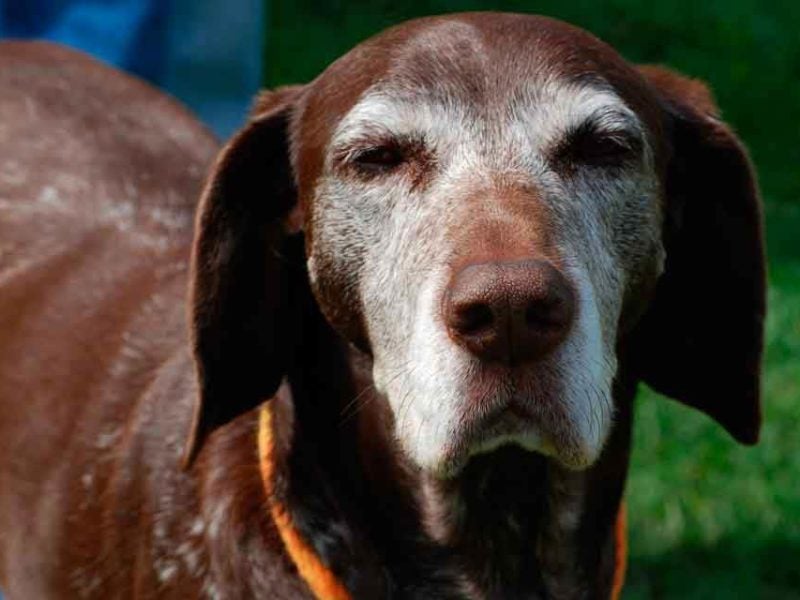
Woofipedia recently ran an article on old dogs, and some readers responded that one of the biggest age-related challenges is dealing with a dog who has gone blind. There are many reasons why dogs lose vision—infections, retinal detachment, accidents, genetic conditions, and disease. In the elderly, glaucoma and cataracts are among the most common causes.
Blindness is devastating for humans who prize their independence. Dogs, however, are lucky in that they are used to depending on others, us, for help. Even better, there are a lot of things you can do for your blind dog to make life easier all around:
#1—Don’t move the furniture.
If you were thinking of redecorating, now is not a good time to do it. Mary Jo Danika Furst, whose 10 1/2-year-old Saint Bernard, Cooper, lost his eyesight to cataracts, wrote: “When Cooper’s cataracts first started, he was running into things and tripping over things that had always been there. Now that he’s adjusted, the only time he has any trouble is when something gets moved.” Keep the furniture, as well as food and water bowls, where they always have been.
#2—Draw a scent map.
Dogs rely more on their noses than their eyes to experience the world, so use that sense to aid navigation. Tracerz, for example, produces markers made of essential oils and wax specifically for this purpose.
#3—Put bells on.
The Blind Dog Rescue Alliance recommends that you wear bells so your dog will have a clue, other than scent, of where you are. Bells work well with other animals in the house, as well.
#4—Give him a halo.
A new product, called the Halo Vest, places a bumper between the dog and any obstacles. It is billed as the “white cane for the blind dog.”
#5—Learn from others.
Many people and dogs have gone through what you are experiencing. Don’t go it alone. You can find help and advice through are support groups, such as blinddogs.com, as well as online resources and books, such as Living with Blind Dogs by Caroline D. Levin, R.N.
#6—Stay put.
Dogs who once loved being out and about may become happier homebodies. Furst says that before Cooper went blind, he was always up for car ride or visit. But now, she says, “the unfamiliarity of stores and other people’s houses, I feel, cause him as much anxiety as it does joy, so we still go on car rides but he stays home when we’re running to the store or friends’ and family’s houses.” If you must take your blind dog to a strange place, be extra vigilant and keep things as familiar as possible, by bringing along her bed, toys, and other reminders of home.
#7—Remember what’s important.
Vision is a key sense for humans, but it’s not the main event for dogs. Scent and hearing play bigger roles in how they experience the world, and that’s just considering the physical senses. Dogs are masters of empathy, so do your best to keep your spirits up, not matter how you feel about your dog’s blindness. Remember, they never have to look at your face to know what you’re feeling. As author Antoine de Saint-Exupéry so eloquently put it in The Little Prince: “It is only with the heart that one can see rightly; what is essential is invisible to the eye.” How perfect is it that the author chose to have those words delivered by a fox?

